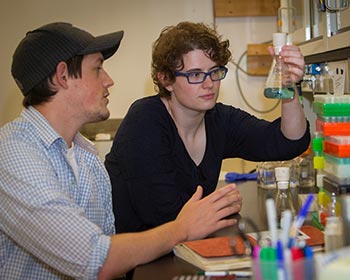
Careers in Microbiology
Students receiving degrees in either Microbiology or Medical Laboratory Science are well prepared for careers in almost any field in medicine, biology, and in every sector of the economy.
Career Diversity
A major in microbiology prepares one for a career in almost any field in medicine and biology. Microbiologists work in every sector of the economy: Universities, Colleges, Schools, Hospitals, Government Agencies, Congress, Industry, the Peace Corps, NASA, and the Military. Here are some of the wide array of career paths available to microbiology majors.
NOTE: Some of the options listed may require training beyond the bachelor's degree.
- Infectious disease
- Technical sales
- Product development
- Medical illustration
- Genetic engineering
- Bioreclamation
- Scientific research
- Forensic Sciences
- Environmental health
- Laboratory administration
- Veterinary microbiology
- Human genome project
- Patent law
- Bioremediation
- Bioethics
- Biotechnology
- Education
- Virology
- Microbial ecology
- Epidemiology
- Clinical microbiology
- Pollution control
- Technical writing
- Immunology
- Infection control
- Quality control
- Food technology
- Molecular biology
- Vaccine development
- Microbial genetics
- Public health
- Microbial physiology
- Environmental law
- Agricultural microbiology
- Drug development
- Bioweapons defense
Find Out More
If you would like to visit a faculty advisor to discuss what the Department of Microbiology has to offer, email us at microbiology@MiamiOH.edu, and we'll schedule an appointment.
Career Resources
- BioOhio - Accelerating Bioscience in Ohio
- Career planning at the American Society for Microbiology (ASM) Career Portal
- Search for jobs at ASM Career Connections
- NewScientist Jobs from the publishers of BioMedNet, Cell, and New Scientist
- Bio Careers
- Science Careers from the journal Science
- FASEB Career Resources
- Sciences-Biological & Physical Career Exploration at Berkeley
- Job listings at CareerBuilder.com
- O*NET OnLine, your tool for career exploration and job analysis, sponsored by the U.S. Department of Labor
- CareerOneStop, sponsored by the U.S. Department of Labor
Students may choose to continue their education in microbiology, molecular biology, genetics, ecology and environmental biology, biochemistry, immunology, virology, mycology, or clinical microbiology.
- Graduate Schools in Microbiology Sciences at Gradschools.com
- The Graduate School Channel at Petersons.com
- USNews.com graduate school rankings
The field of Forensic Science covers diverse disciplines, ranging from Criminalistics and Jurisprudence to Forensic Pathology and Forensic Odontology. A major in microbiology can help prepare you for a career in Forensic Science or for graduate study in Forensic Science. For example, the minimum requirement for Criminalistics is a bachelor's degree in chemistry, biology, physics, molecular biology, or related sciences (i.e. Microbiology or Medical Lab Science), and in the future, a master's degree may be required. Other Forensic Science disciplines can require medical, dental, or engineering degrees.
Many colleges and universities offer degrees and courses in Forensic Science. In deciding whether to get a bachelor's degree in chemistry, biology, microbiology, or forensic science or to pursue a post-graduate degree, consider your career preferences and study the courses offered. At least 24 semester hours of either chemistry or biology is required and math is a must. The title of the degree is often not as important as the courses taken (adapted from the American Academy of Forensic Sciences).
- Michigan State University's Forensic Science FAQs
- Graduate Schools in Forensic Science at Gradschools.com
- American Academy of Forensic Sciences
Many graduates choose to go to professional schools in medicine, dentistry, veterinary medicine, law, or business.
